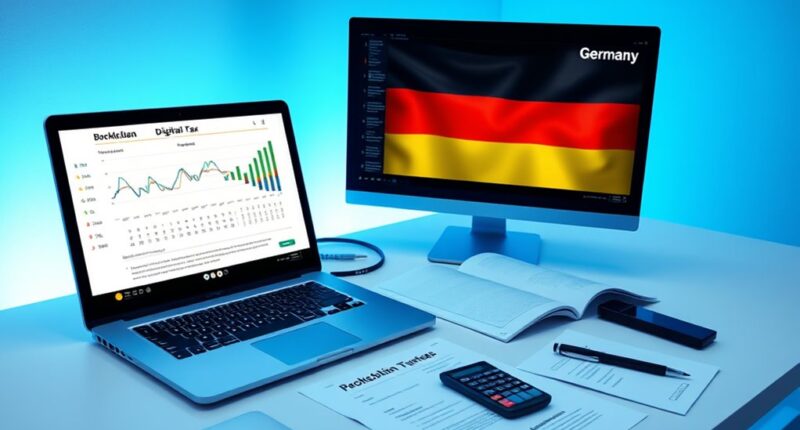To comply with Germany’s crypto tax rules in 2025, you should classify your cryptocurrencies as private money and keep detailed records of all transactions, including purchase dates, amounts, and sale prices. Stay informed about updates from the Bundesfinanzministerium, as regulations can change. Report any gains or losses accurately in your tax filings to avoid penalties. Continue exploring to learn how to navigate these regulations effectively and ensure full compliance.
Key Takeaways
- Keep detailed records of all crypto transactions, including purchase dates, amounts, and sale prices, for accurate reporting.
- Stay updated on official regulatory changes from Bundesfinanzministerium to ensure compliance with current laws.
- Report all taxable gains within one year of acquisition to avoid penalties under short-term capital gains rules.
- Determine whether your crypto activities are private or commercial to meet specific tax obligations and registration requirements.
- Consult with crypto-savvy tax professionals to interpret evolving regulations and develop compliant strategies.

Exploring Germany’s crypto tax regulations in 2025 can be complex, but understanding the rules is vital to stay compliant. As a crypto investor or trader, you need to grasp the specifics of tax reporting and stay updated on regulatory changes that might affect your obligations. Germany’s tax authority, the Bundesfinanzministerium, regularly updates its stance on cryptocurrencies, making it essential for you to stay informed about regulatory updates to avoid penalties or legal issues.
Staying informed on Germany’s evolving crypto tax rules is essential for compliance and avoiding penalties.
First, you should recognize that cryptocurrencies are classified as private money, meaning that any gains from trading or selling crypto are taxable if they’re realized within a year of acquisition. This short-term capital gains rule means you need to keep detailed records of your transactions, including purchase dates, amounts, and sale prices. Proper tax reporting isn’t just about recording your trades; it also involves accurately calculating your gains or losses and reporting them in your annual tax declaration. If you fail to report crypto earnings correctly, you risk facing fines or audits, which can be costly and time-consuming.
Regulatory updates are a key factor to monitor because the German government has shown increasing interest in clarifying how cryptocurrencies fit into the existing tax framework. Recent updates have clarified that even small-scale transactions might be taxable, and certain crypto activities like staking or earning interest could have specific tax implications. Staying current with these updates means regularly checking official communications from the Bundesfinanzministerium or consulting with tax professionals who specialize in crypto regulations. They can help you interpret new rules and adjust your reporting practices accordingly.
Another important aspect is understanding the distinction between private sales and commercial activities. If you’re frequently trading or mining cryptocurrencies, you might fall into a different tax category, which could require you to register a business and pay additional taxes. Keeping detailed records of your activity helps you determine your classification and ensures you’re reporting income correctly. The German tax authorities are increasingly scrutinizing crypto activities, so transparency and thorough documentation are your best defenses. Additionally, embracing creative problem-solving can help you navigate complex regulations more effectively by finding compliant strategies and optimizing your tax position.
Frequently Asked Questions
Are Airdrops Taxable in Germany?
Yes, airdrops are taxable in Germany. According to crypto airdrop rules, you must report the value of the received tokens as income when you claim them. Airdrops taxation depends on whether you hold or sell the tokens later. You should keep detailed records of each airdrop, including the date and value, to verify compliance with German tax authorities and accurately calculate your taxable income.
How Are Staking Rewards Taxed in 2025?
Staking rewards are taxed as income in 2025, so you must include their reward valuation in your income tax calculation. Unlike capital gains, staking taxation treats these rewards as regular income, making it essential to precisely determine their value at the time you receive them. You should keep detailed records of reward amounts and their valuation to ensure compliance and proper reporting on your tax return.
What Records Are Necessary for Crypto Tax Reporting?
You need to gather thorough tax documentation, including records of all your crypto transactions, staking rewards, and exchanges. Keep detailed logs of purchase and sale dates, amounts, and prices. This will help you accurately report your gains and losses. Be aware of reporting deadlines to avoid penalties. Organize your records now to guarantee smooth and compliant crypto tax reporting in 2025.
Does Germany Recognize Foreign Crypto Exchanges?
You might worry about foreign exchanges not being recognized, but Germany does acknowledge foreign crypto exchanges for tax reporting. As long as you track your transactions and report gains accurately, you’re compliant. Keep in mind, exchange regulation applies across the board, so maintaining detailed records is essential. This way, even if the platform isn’t German-based, your tax obligations are clear, and you stay within legal boundaries.
Are Hardware Wallets Considered When Calculating Taxable Assets?
Hardware wallets are considered when calculating taxable assets in Germany, especially for tax reporting purposes. You need to include the value of your crypto holdings stored on these wallets as part of your overall assets. Keep detailed records of your hardware wallet transactions and balances to guarantee accurate reporting. Failing to account for hardware wallets can lead to tax discrepancies, so make sure you document everything carefully for compliance.
Conclusion
Charting Germany’s crypto tax rules in 2025 is like steering a ship through changing tides; stay informed, keep detailed records, and consult trusted guides along the way. Just as a skilled sailor reads the stars to find safe passage, understanding the regulations helps you chart a clear course through the complex waters of crypto taxation. With vigilance and preparation, you’ll reach your destination smoothly, avoiding storms and ensuring your crypto journey remains compliant and secure.









